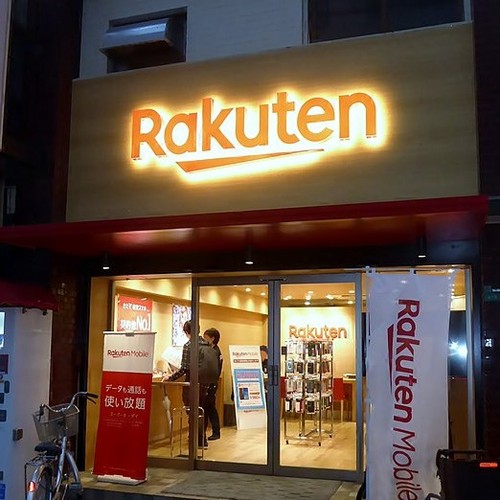
Rakuten's new-look mobile network is much cheaper to build than old-fashioned ones, the Japanese company has been fond of telling the industry. Yet as costs have spiraled and losses have mounted, it is now selling about $2.2 billion worth of shares to continue funding the rollout.
The transactions announced today include the sale of an 8.32% stake to Japan Post Holdings for about 150 billion Japanese yen ($1.3 billion). Other investors, including Tencent and Walmart, are spending roughly JPY92 billion ($840 million), implying about 11.5% of Rakuten has been sold. The deals have had a dramatic effect on Rakuten's share price in Japan. Today, it closed up 8.6% and is around the same level it was in October 2020, following some peaks and troughs in recent months.
Everything raised will go on the company's expensive project to construct a fourth mobile network in Japan. In a breakdown of its plans, Rakuten says it will spend JPY184 billion ($1.7 billion) on 4G basestations, another JPY31 billion ($280 million) on 5G ones and about JPY25 billion ($230 million) on "equipment common to 4G and 5G," such as the servers used in data centers. All the funds are to be invested by December this year.
Bill shock
The update comes just a few weeks after Rakuten warned investors that its mobile bill would be about $2 billion more than it previously thought. Until February, it had estimated the cost of 4G network construction at around $5.7 billion. Now it expects to invest between $7.4 billion and $8 billion.
The explanation provided at the time was that Rakuten needs additional 4G basestations to improve service quality. It had reckoned precisely 27,397 would do for population coverage of 96% but has hiked this figure up to 44,000. That boost could help compensate for a lack of 4G spectrum: Rakuten holds just a 20MHz 4G allocation, about a fifth as much 4G spectrum as any rival. In parts of Japan, moreover, the defense ministry still occupies three quarters of its spectrum.
Figure 1:  The glass is always half full for Rakuten CEO Hiroshi Mikitani.
The glass is always half full for Rakuten CEO Hiroshi Mikitani.
Even so, the operator's total bill for network rollout is now approaching JPY1 trillion, based on previous data from MoffettNathanson, an analyst firm. The entire effort has been a deadweight on group financials. While sales rose 15.2% last year, to about JPY1.46 trillion ($13.4 billion), Rakuten swung to an operating loss of JPY102.7 billion ($940 million) from a profit of JPY95.1 billion ($870 million) the year before.
A lackluster response to Rakuten's launch of mobile network services has not helped. After a Sisyphean marketing push, it nudged across 3 million service "applications" earlier this week, almost a year after the 4G service was first launched. To put that into international context, France's Iliad managed the same number – and claimed "subscribers" rather than applications – in just seven months in Italy, a country half as populous as Japan.
Want to know more about 5G? Check out our dedicated 5G content channel here on Light Reading.
Most Japanese consumers have not been lured by Rakuten's offer of free or heavily discounted services, despite the other benefits the e-commerce player can promise. NTT DoCoMo, the market leader, boasts around 80 million subscribers. If Rakuten's heavier reliance on cloud and software technologies gives it any kind of competitive advantage, it is not yet apparent in the numbers.
Some leading analysts remain unconvinced, too. When Rakuten announced even lower-cost tariffs earlier this year, New Street Research said the move "largely maintains the previous price gap with incumbents," which have also been cutting fees. "Rakuten is sticking with target breakeven in 2023, but we think losses are likely to be higher than previously modelled," it wrote in a research note.
The investments announced today bring some interesting partners besides cash for shares. Hiroshi Mikitani, Rakuten's CEO, reckons a tie-up with Tencent alone could lead to a "broad portfolio of opportunities," including online games and e-commerce. Walmart's involvement is also interesting given its huge retail presence in the US. And with Japan Post, Rakuten is already planning the creation of shared logistics centers and use of post office facilities to sell mobile services. It would be funny if something as old-fashioned as floor space in a shop makes the difference to such an ardent technophile.
Related posts:
— Iain Morris, International Editor, Light Reading
Read more about:
AsiaAbout the Author(s)
You May Also Like




_International_Software_Products.jpeg?width=300&auto=webp&quality=80&disable=upscale)







